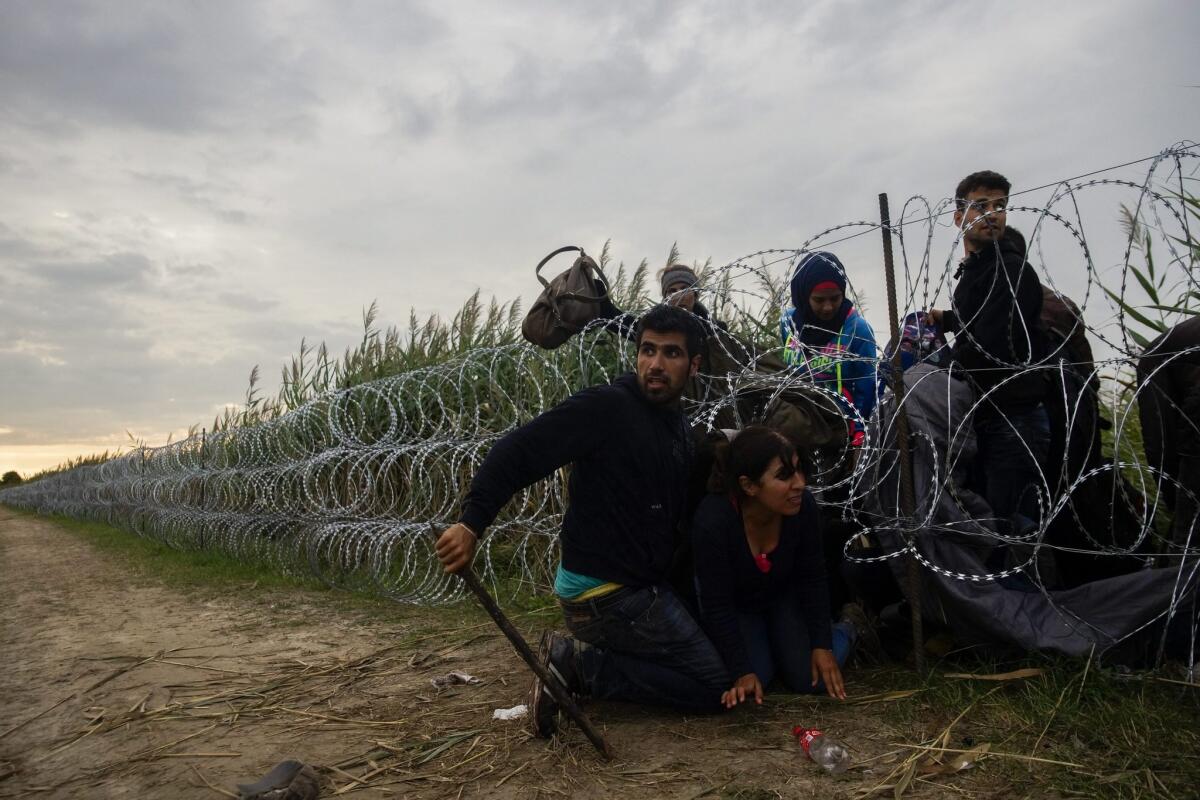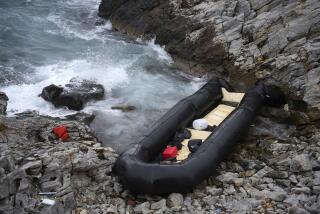50 bodies found in ship’s hull as migrant wave inundates Europe

Migrants make their way through a razor-wire fence at the border between Hungary and Serbia near Roszke on Aug. 26.
- Share via
As tens of thousands of migrants fleeing war and poverty attempt to reach safety in Europe, the death toll rose above 2,400 on Wednesday, and skirmishes broke out along the Serbian-Hungarian border.
This summer’s unprecedented exodus from Syria, Afghanistan, Eritrea and other nations in turmoil has inundated Southern Europe and exhausted the generosity of countries suffering their own economic woes.
Still, the tide of desperate refugees has continued to mount in spite of new obstacles thrown in their path, such as the razor-wire fence being built on Hungary’s southern border that is bottling up the migrants in impoverished Serbia.
Italy’s coast guard found the bodies of 50 migrants in the hull of a ship off the Libyan coast from which a Swedish vessel had rescued more than 400 survivors.
The latest deaths from dehydration and suffocation bring the seasonal toll to more than 2,400, from among the migrants expected to number well over 1 million by year’s end, according to United Nations figures.
Relatively calm seas and escalating violence in the Middle East and North Africa have encouraged thousands to make the perilous Mediterranean crossing each day and fueled the rugged passage through Italy and the Balkans by those hoping to reach the more prosperous countries of Northern Europe.
The Greek coast guard reported Wednesday that crews had rescued 578 migrants in the previous 24 hours from boats off the Aegean islands west of Turkey. Most of the migrants entering Europe through that route are Syrians fleeing the civil war now in its fifth year.
Those who make it to shore on the islands are transferred to Athens for registration, which is supposed to happen in the first European Union country they enter. But many elude the official processing and head north for Germany, Sweden, Austria or the Netherlands -- all countries where refugees can expect better treatment than in the economically teetering Balkans.
That onward migration has created a bottleneck at the Greek-Macedonian border, where authorities have been struggling to provide water, food and shelter to the crowds expanding by about 3,000 people per day, the U.N. Office of the High Commissioner for Refugees reported Tuesday.
In recognition of the spiraling humanitarian crisis, the European Commission on Wednesday released $1.7 million in funds for refugee assistance to the Red Cross operations of Serbia and Macedonia.
Macedonian authorities have been quickly packing the daily arrivals on to buses after registration procedures, so they can travel north through Serbia and attempt to cross into Hungary through weak spots in the unfinished fence along the 110-mile border.
Hungary’s governing Fidesz party issued a statement Wednesday declaring the country unable to care for the thousands of refugees being detained each day.
Tuesday saw another record number of arrivals who Budapest officials consider illegal, with 2,533 detained, up from the former record on Monday of 2,093. Hungary has counted more than 160,000 migrants so far this year, about four times the number in all of 2015.
Lawmakers of Fidesz, a right-wing party headed by Prime Minister Viktor Orban, called for deployment of soldiers, helicopters and patrol dogs to the border to be discussed at a parliamentary session next week.
The migration crisis not only poses economic challenges to the 28 nations of the European Union, it strains their solidarity and alliance cohesion. The bloc’s human rights policies require member states to accept those seeking asylum from violence and repression, but not all in the alliance regard aiding the migrants as a humanitarian obligation.
Hungarian police on Wednesday used tear gas to quell disturbances among the crowds of migrants waiting to be registered at the Roszke border crossing.
An additional 1,300 refugees had been detained along the Hungarian-Serbian border well before noon, the Hungarian police commissioner’s office reported.
In Germany, the desired destination for many in the migration wave, Chancellor Angela Merkel was heckled by right-wing anti-immigrant protesters during a visit to the Heidenau migrant camp near Dresden.
The camp was the scene of violent demonstrations on Saturday and Sunday, when more than 1,000 gathered to protest the temporary settlement of about 250 migrants at a converted store in their town.
About 100 protesters booed the chancellor, who used the visit to appeal to her countrymen for tolerance and respect for “the dignity of others” forced to flee chaos in their homelands.
Follow @cjwilliamslat for the latest international news 24/7
More to Read
Sign up for Essential California
The most important California stories and recommendations in your inbox every morning.
You may occasionally receive promotional content from the Los Angeles Times.













